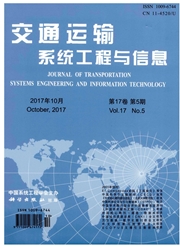

 中文摘要:
中文摘要:
交通运输业已成为我国二氧化碳排放的重要部门,在发展交通运输业的同时应努力降低其碳排放量.本文定义了交通运输碳排放效率,建立了交通运输碳排放效率影响因素解模型,其影响因素分为技术进步和结构调整两类.以吉林省为案例进行实证分析,研究结果表明,技术进步因素是影响交通运输碳排放效率增长的主要原因,结构调整因素抑制了交通运输碳排放效率的增加.各种运输方式中,公路运输促进了总碳排放效率的增加,铁路运输促进了总碳排放效率的降低,其他运输方式对总碳排放效率的影响相对较小.
 英文摘要:
英文摘要:
With the rapid development of China's transportation industry, the transportation sector has become an important sector of China's carbon dioxide emissions. So while we strive to develop the transportation sector, but also to reduce their carbon emissions. The efficiency of transportation emissions is defined in the paper, and a transportation emissions efficiency factors solution of the model is built. The factors of the efficiency of transportation emissions are divided into technological progress and structural adjustment. Jilin Province as a case is analyzed, and the results show that: the technological advances factor affects the efficiency of transportation emissions mainly due to growth, and the structural adjustment factor inhibits the increase in transportation emissions efficient. In all modes of transportation, the road transport has led to increased efficiency of the overall carbon emissions, and the railway transportation has led to lower overall carbon emissions efficiency. Effect of other modes of transportation on carbon efficiency is relatively small.
 同期刊论文项目
同期刊论文项目
 同项目期刊论文
同项目期刊论文
 期刊信息
期刊信息
